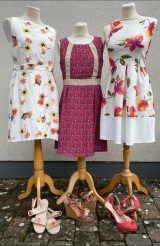The women behind CycleUp reimagine all sorts of materials into products like kitchen aprons, trendy tote bags, bandanas, bucket hats, and pretty much anything you can imagine – even party-style bunting. More importantly, they reimagine the way women’s lives can be lived in rural Ireland; it’s a way to upskill, socialise with others, put control in women’s hands, and contribute to the cycle of people helping people.
CycleUp all started with a pilot program that saw 12 women learn about textiles. A number of those women quickly took it upon themselves to become QQI accredited during lockdown, and some of these women who were once learning are now teaching others – providing CycleUp workshops around the region. This training and these workshops are such crucial parts of the CycleUp story because they are all about grassroots community development, allowing women to learn from one another in practical, enjoyable ways. In addition, there is also the production studio aspect where the women who have been trained are able to let their imaginations go in all sorts of creative ways, conjuring the beautiful, usable products that can be purchased from the online store.
The CycleUp textiles project proves that real change happens from the ground up and is inclusive. Equally importantly, the women who identified the need and started it are representative of the women and community that needs it most. In other words, the idea started with the women, and it has stayed with them – they own it and it’s empowering them and others to enrich their own lives.
Nora Fahy, project manager at the Roscommon Women’s Network passionately explains that it all started as a social endeavour, where women could come together in a space where they could feel safe, secure, and not judged.
“We didn’t come up with the idea; with us, it was the other way around.”
The Roscommon Women’s Network was established in 2007, right on the cusp of the financial crash, which meant that they were hit with a difficult path right from the outset – but the women at the enterprise’s core weren’t willing to let that get in their way. Efforts to raise money saw the women really give the endeavour a new lease of life, and they were able to navigate through the crisis as a result. In 2013, a pop-up shop was set up, sowing the seeds for CycleUp to grow into what it is today.



“It made a fortune in two months. Three of these women had children in care, and they were recovering from addiction. Some of these women were just at home, wanted to get out – their kids were in school – it was a real integrated bunch. One of the ladies was 80, and she had more energy than any of them; she had worked a lot in England in charity shops so she was a great woman to have on the team.”
Eventually, as new people started to join CycleUp’s mission, they began asking questions around sustainability, and what happens to the clothes that didn’t sell. A group visit to the Rediscovery Centre in Dublin ultimately lit the fire for the other half of what CycleUp stands for – something that would breathe new life into unwanted clothes and other fabrics, thus giving it its green-friendly ambition. And this speaks to the co-operative ethos – the idea was nurtured through collaboration with the likes of the Rediscovery Centre, local councils, Patagonia, funding, and of course women-led community power.
From 2018 on, these women have been volunteering – and they are really immersed in their ambition to make a positive difference, both in their own lives, and on the environment. Today, a team of more than 20 volunteers oversees the daily activities. Funding has been pivotal to the CycleUp story’s progression – and figures from 2020 show that they are having a direct impact on the environment; that year, they reused almost 2,000kg of upcycled material, recycled some 58kg, and achieved 19,000kg of carbon savings. None of this would be possible without the women volunteering on a day-to-day basis.
“That is what makes this – and a lot of social enterprises – so unique is that it’s not from the top down, it’s from the bottom up,” Nora said.
A great example of this in action was when one of the ladies convinced Nora to buy an industrial weighing scale. Her reasoning was that if they wanted to quantify the problem, they would have to weigh the clothes so that they could figure out just how much work they needed to do – and this in turn would provide them with the figures needed to apply for things like grants.
This lady is just one of many forward-thinking ladies in the group.
Another of the women involved in CycleUp explains why she got involved: “I have always cared about the environment and have been concerned about the level of wanton consumerism for a long time…I really enjoy the process of finding out what would be a good thing for the group to produce and the experimental process in making something new.”
Another lady told me about how she courageously moved on from a toxic relationship, overcame two car accidents, and built a new life for herself – in addition to studying at higher level and getting involved in the RWN. She explains that CycleUp has been a way for her to channel her love of helping others upskill and broaden their knowledge:
“When we are out giving classes, it can be quite funny with some of the things that the people we are teaching come up with. In one of the classes, two of the students wanted to show everyone how they made ‘knickers’ for charity, so we said fair enough and had a demonstration class. At first, other students were not thrilled with the idea of making them, but by the end of the class they were in stitches laughing with what they made and loved it…Seeing how the people that I have trained continued on with the sewing, makes me think this is where I should be and what I should be doing.”
Nora explains that one of the first things the group made was a little owl teddy – a symbol for wisdom and education – something that the women authentically identified with. Since then, they’ve created all sorts of beautiful, practical, and chic items, repurposed from materials that might otherwise have been sent to the dump. As Nora explains, the mindset of the CycleUp women is something everyone can learn from, and truly defines what social enterprise is all about.
“It would never have happened without that collective action they had – that wanting to do something local,” Nora says, adding that while they might not have seen a problem they could solve at first, CycleUp gradually allowed them to realise they could make a massive difference.
“They had too many struggles in their own lives to be dealing with anything bigger, but they wanted to – and this CycleUp really gave them the opportunity. And one of the reasons so many of them feel good now is because they feel in their own way they ware saving the planet; that’s empowering disadvantaged people, and that’s what social enterprises are all about.”
So, what’s Nora’s advice to people who want to become social entrepreneurs?
“You have to be a person who’s motivated by seeing people progress,” Nora says, adding that changing intergenerational paths is such an important thrust behind the eagerness to be involved; in other words, seeing people, families, and communities, breaking out of the likes of a “welfare trap”.
Importantly, Nora adds that there is also an underlying ‘education’ that happens with people who can benefit from social enterprises – learning from others opens people’s eyes to what is right and what is wrong.
Undoubtedly, CycleUp is really opening people’s eyes – both the women who are driving the positive change, and the people who can see from the outside what social enterprises are doing. For sure, more CycleUps are needed around the country, and it’s remarkable to think on what they have achieved – and what they will continue to achieve in the future.
This project was approved by Government with support from the Dormant Accounts Fund
